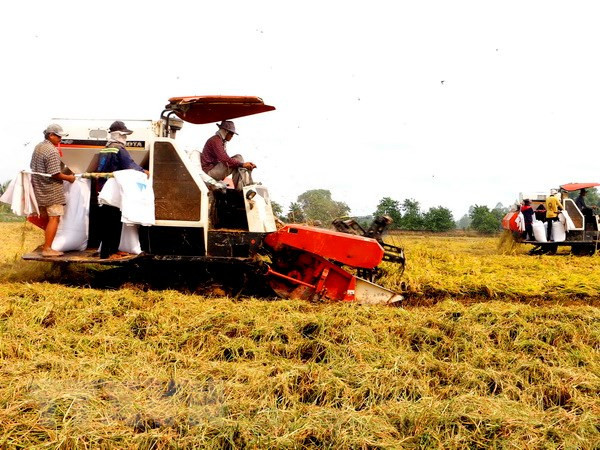TienGiang (VNA) – Around 11,500 farmers in areas highly vulnerable to flood in the Mekong Delta province of Tien Giang are benefiting fromthe Vietnam Sustainable AgricultureTransformation project(VnSAT) implemented in the locality in 2018.
Withan investment of 52 billion VND (2.28 million USD) for this year, the project provides local rice farmers with training courses on how to change behavioursin agricultural production and better cultivation techniques, thus improving economicefficiency from growing rice, said Vice Director of VnSAT in Tien Giang Le ThiYen.
Over 7,600 ha of cultivation land will be applied sustainable rice cultivation solutionsin the year, Yen said.
Along with transferring sustainable rice cultivation techniques, the projectalso helps credit institutions and cooperatives improve infrastructure and equipment,promote communications and training activities, and organise relevant workshops.
VnSAT has a total investment of 15.3 million USD, including over 9 million USDfrom official development assistance (ODA). It has been carried out between2015 and 2020 in flood-prone Cai Lay and Cai Be districts and Cai Lay township,benefing more than 41,000 households.
Since its launch, the project has opened 442 short-term training courses for overfor nearly 17,000 farmers.
Covering an area of over 27,000 ha, the project aims to support implementation of the new agenda in twosub-sectors, including high value rice production for export in the MekongDelta and coffee in the Central Highlands.
It helps strengthen the ability of governmentalagencies in research, design and transferring technologies to farmers, as wellas implementing and supervising restructure, and renewal of the agriculturalsector.
In addition, it has also provided direct supportto around 140,000 households planting rice in eight Mekong Delta localities includingKien Giang, An Giang, Hau Giang, and Tien Giang, Long An, Dong Thap, Can Thoand Soc Trang, to access and apply advanced technologies.
The households benefiting from the project bybeing able to join the value chain from production to consumption. Theirprofits were expected to increase by 30 percent per hectare, bringing the totaladditional value between 40 million USD and 60 million USD a year for the wholeregion.
In the Central Highlands region, around 63,000farmer households in five provinces of Lam Dong, Dak Lak, Dak Nong, Gia Lai, andKon Tum, have had access to technologies of sustainable coffee planting andre-planting, with expected additional income of 20 percent a year and 50million USD for the region. -VNA




























